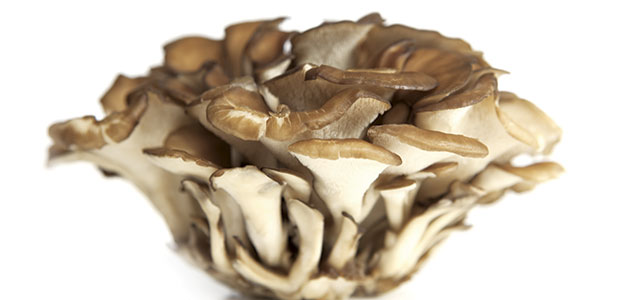Advertisement
Mushroom Power
Ancient remedies, modern supplements

Mushrooms have been eaten for thousands of years in Asian countries for their health-promoting benefits. In the past several decades, researchers have begun to explore the active constituents of certain mushrooms in order to understand their full potential to improve health. While some of these mushrooms are edible, all five discussed here are available in convenient supplement form.
Reishi
Reishi (Ganoderma lucidum) is a bitter tasting fungus whose edible (although not palatable) part is the fruiting body of the mushroom. It grows on the wood of deciduous trees, and is notable for its large stalk and fanlike fruiting body. The active constituents are its polysaccharides, triterpenes, and beta-d-glucans.
Medicinal qualities
The polysaccharides in reishi play an important role in regulating the immune system, enhancing tumour response, and lowering blood pressure. Triterpenes inhibit histamine release, improving seasonal allergies as well as liver function. Reishi is often referred to as an adaptogen, which means it helps the body adapt to stressful environments.
Health benefits
A wide range of health conditions have been shown to benefit from reishi supplements. These include cancer, high blood pressure, elevated cholesterol, rheumatoid arthritis, chronic fatigue syndrome, and many viruses.
Reishi’s immune-boosting effect and ability to improve tumour response make it useful as a complementary alternative treatment in cancer care. Other areas of interest stemming from its effect on the immune system involve treating hepatitis and the herpes virus. Some animal studies have shown promise in the use of reishi to reduce plasma glucose levels in type 2 diabetes.
Maitake
Maitake (Grifola frondosa) can be eaten as a food, but research shows that the extract, maitake D-fraction holds superior medicinal benefits. The active constituent is 1,6-beta-glucan, a protein-bound polysaccharide, which benefits the immune system and limits tumour proliferation.
Medicinal qualities
Another constituent, the alpha glucans, have been shown to have an effect on insulin sensitivity. Due to its effect on blood sugar, maitake is commonly used in the treatment of diabetes and for weight loss.
Over 30 years of research shows maitake mushroom D-fraction to be a potent immune system modulator with antitumour activity. The main research focus continues to be on its use in cancer therapy, either to enhance the effectiveness of chemotherapy or to decrease the side effects of cancer drugs.
Health benefits
Maitake D-fraction has been shown to shrink cancer tumours and decrease pain caused by chemotherapy. It also alleviates chemotherapy side effects such as hair loss, nausea, and low white blood cell count. It’s also used in the treatment of high blood pressure, elevated cholesterol, and viral infections.
Shiitake
Shiitake (Lentinus edodes) is the second most cultivated edible mushroom worldwide. Either the extract or the whole dried mushroom is used in herbal preparations. The active constituents are lentinan, 1,3-beta-glucan, and eritadenine.
Medicinal qualities
The most studied active component is the polysaccharide lentinan, which slows tumour growth rates. The 1,3-beta-glucan is used to ease the side effects of chemotherapy drugs. The eritadenine component is being studied as a way to block cholesterol absorption into the blood.
Health benefits
By stimulating the immune system, shiitake aids in slowing tumour growth and the progression of AIDS. Shiitake has been shown to lower cholesterol in the blood and may be useful in the prevention of heart disease. Studies show that it also lowers triglycerides and prevents fat deposits in rats fed a high-fat diet. Shiitake contains proteins that stop viruses of many types from replicating.
Chaga
Chaga (Inonotus obliquus) is a slow-growing white rot fungus that grows on birch trees in cold climates in North America, northern Europe, and Russia. Its active ingredients include phenolic compounds, melanins, and lanostane-type triterpenoids.
Medicinal qualities
Chaga is used as a folk medicine in the Baltic areas of Europe and Russia to treat tumours and other diseases without toxic side effects. Its active components produce antiviral, anti-inflammatory, and antitumour effects. Chaga also strengthens the immune system.
Health benefits
Chaga has many uses including the treatment of allergies and bacterial infections, and the reduction of inflammation and oxidative stress in the body. A 2010 study examined its use in blood sugar stabilization and type 2 diabetes. A 2010 study showed that chaga and its compounds may hold potential as natural anticancer ingredients in food or pharmaceutical products.
Cordyceps
Cordyceps (Cordyceps sinensis) is a fungus that is closely related to mushrooms and is used like a medicinal mushroom. It grows in high altitude climates in the Himalayas. Cordyceps grows from a base of caterpillar larvae that the fungus feeds on.
Medicinal qualities
The active constituents of cordyceps include the polysaccharides, cordycepin, modified nucleosides, and the cyclosporine-like components. Clinical interest of cordyceps revolves around its effect on the immune system and antitumour activity.
Health benefits
Traditionally, cordyceps is said to cure 21 ailments including cancer, asthma, diabetes, and viruses. In its fermented form, it can be used to enhance endurance in athletes.
| Type of mushroom | Form used | How to take it | Possible contraindications | Uses |
| reishi | concentrated extract | up to 5.4 g of extract per day | not recommended for those with low blood pressure or a clotting disorder called thrombocytopenia | cancer care, immune system booster |
| maitake | liquid extract, tablet, and capsule form | 3-7 g per day | if you take blood sugar lowering medication or warfarin, you should not use maitake | immune system booster |
| shiitake | capsulated extract, fresh, or dried | 8-15 g per day | generally safe; potential for allergy does exist | cancer care, cholesterol management |
| chaga | capsulated extract, tea | dissolve 1 tsp (5 mL) dried mushroom in 1 cup (250 mL) water | generally safe | cancer care, blood sugar management |
| cordyceps | concentrated extract | 3-9 g of concentrated extract taken daily up to 8 weeks | mild digestive side effects are possible | antiviral, cancer care, diabetes, asthma |





